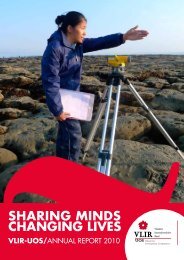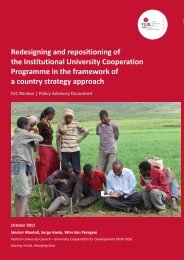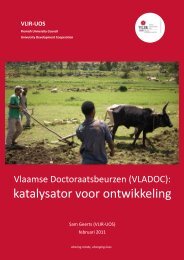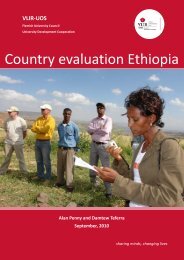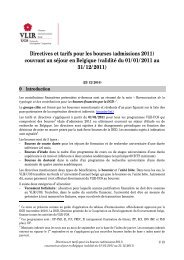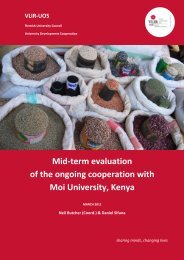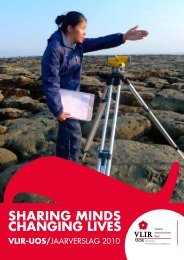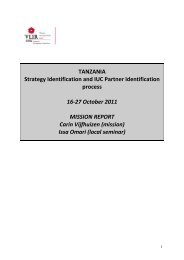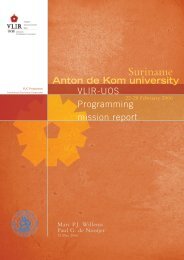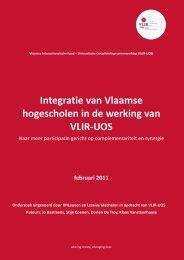Education Sector Development Program - VLIR-UOS
Education Sector Development Program - VLIR-UOS
Education Sector Development Program - VLIR-UOS
You also want an ePaper? Increase the reach of your titles
YUMPU automatically turns print PDFs into web optimized ePapers that Google loves.
<strong>Education</strong> <strong>Sector</strong> <strong>Development</strong> <strong>Program</strong> IV<br />
particular emphasis to science and technology.<br />
Several steps will be taken in this regard:<br />
❚<br />
❚<br />
❚<br />
❚<br />
Building the implementation capacity<br />
of technology institutions<br />
Integrated implementation of<br />
the different aspects of Teacher<br />
<strong>Development</strong> <strong>Program</strong>s and the<br />
provision of qualified and professional<br />
teachers to continue implementation<br />
of the newly changed curriculum<br />
(in the delivery of teaching learning<br />
process, student assessment, grading<br />
system etc.)<br />
Achieving increased enrolment<br />
based on equitable and 70:30 ratio of<br />
streams<br />
Building the capacity of the<br />
universities in generating sufficient<br />
income i.e. 5% of the budget shall be<br />
their internal income that can enable<br />
them to strengthen the relevance and<br />
quality of the training.<br />
❚ Developing mechanisms of supporting<br />
peoples with less readiness to<br />
continue their education<br />
Staff development opportunities at advanced<br />
levels of the higher education system will be<br />
enhanced so that young academic staff currently<br />
teaching with a bachelor’s degree can grow<br />
academically. In addition, joint appointments<br />
of professional staff will be applied to curb the<br />
shortage of higher education teachers and a<br />
mechanism will be established to utilize the<br />
qualified human power in other sectors. Young<br />
academic staff will all have to undergo certified<br />
training on teaching methodology.<br />
In order to further improve teaching learning<br />
conditions within the universities, capacity for<br />
internal quality management will be developed<br />
at the institutional level, including systems to<br />
assess the employability of higher education<br />
graduates such as through tracer studies. In the<br />
development of their IQA system, HEIs will be<br />
guided by an expanded National Qualifications<br />
Framework which will establish generic and<br />
subject specific learning outcomes for academic<br />
programs. HEIs will be supported in establishing<br />
an assessment policy and a system which<br />
can assure that exams are set to measure<br />
appropriate learning outcomes of individual<br />
courses, and also fair grading systems. HEIs will<br />
be equipped with libraries, laboratories and ICT to<br />
improve the teaching learning process as well as<br />
management. Furthermore, it is envisaged that<br />
ETQA will establish a system for identification<br />
and dissemination of best practices in higher<br />
education available locally and internationally<br />
and develop a national mechanism for the<br />
assessment of graduates’ competences.<br />
Affirmative action for traditionally disadvantaged<br />
groups such as females, students from<br />
disadvantaged regions and students with<br />
special needs will be strengthened<br />
through preferential access,<br />
academic support programs, and the<br />
establishment of a gender–friendly<br />
environment and climate at HEIs.<br />
Specific support provided to female<br />
leaders will receive special attention.<br />
Affirmative action programs will also<br />
include the following:<br />
❚<br />
❚<br />
Ensure the establishment of a<br />
system that can develop awareness<br />
in the university communities<br />
to condemn and control sexual<br />
harassment, gender biased violence,<br />
female discrimination and harmful<br />
practices.<br />
Develop the awareness and skills<br />
of the university communities to<br />
protect themselves from HIV/AIDS and<br />
transfer their knowledge to change<br />
the attitude of the surrounding young<br />
people.<br />
❚ Establish and practice reward<br />
systems that motivate individuals and<br />
institutions to recognize their results<br />
and achievements and to be used to<br />
inspire others.<br />
In line with the Higher <strong>Education</strong> Proclamation,<br />
ESDP IV will emphasize the development of<br />
research capacity throughout the system. A<br />
framework for national research priorities<br />
will be developed in line with which HEIs will<br />
develop their own priorities. In addition, a system<br />
for a posteriori evaluation of research will be<br />
established. Universities will receive support for<br />
the establishment of research policies, including<br />
through innovation funds. As HEP 2009 stipulates<br />
that university-enterprise partnerships shall be<br />
enhanced, ESDP IV will extend support to selected<br />
universities for the creation of technology<br />
transfer business units and consultancy<br />
centers, in particular at Institutes of Technology<br />
(IoTs). ESDP IV will also build the research and<br />
development system that gives emphasis to<br />
technology transfer and to expand and exercise<br />
useful technologies. This implies building the<br />
capacity of technology institutions in technology<br />
transfer by giving due emphasis to exercising<br />
and expanding useful technologies and making<br />
universities’ research and development systems<br />
to be the principal factor to evaluate their outcome<br />
and contribution for country development. The<br />
research and development system will get due<br />
attention to have its own budget and capacity<br />
building program will be arranged.<br />
In order to further<br />
improve teaching<br />
learning conditions within<br />
the universities, capacity for<br />
internal quality management<br />
will be developed at the<br />
institutional level<br />
65



